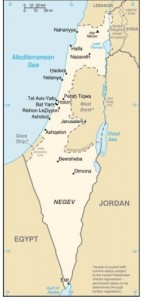Massive US-Israeli Military Drill Set for October
The exercise is meant as a show of force and a threatening posture towards Syria and Iran
by John Glaser, June 25, 2012
Israel and the US are set to hold their largest ever joint military exercise in October, which will include thousands of soldiers and advanced weaponry as well as a simulation of simultaneous fire from Iran and Syria.
 About 3,000 US soldiers will participate in the highly militarized, highly provocative, highly unnecessary drill, alongside thousands of Israeli troops.
About 3,000 US soldiers will participate in the highly militarized, highly provocative, highly unnecessary drill, alongside thousands of Israeli troops.
The exercise will simulate missiles being fired at Israel from Iran and Syria simultaneously, despite how thoroughly unrealistic such a scenario is. Israel will test its upgraded “Arrow 2″ missile defense system, while the US will deploy the Aegis Ballistic Missile Defense System and PAC-3 Patriot air defense platforms.
Some military analysts have referred the exercise as a “dress rehearsal” for a potential military conflict, emphasizing that it will send a clear – and threatening – message to Iran at a time when the Islamic Republic has been needlessly targeted in a harsh set of economic sanctions for what everyone agrees is currently a civilian nuclear program.
These ostentatious military exercises are a common way to threaten adversaries like Iran. Just last month, the US completed a massive military exercise called Operation Eager Lion in Jordan that included 18 other nations and served as a very provocative show of force in a very unstable region.
Michael Eisenstadt, director of the Military and Security Studies program at the Washington Institute for Near East Studies, said the drill “puts more pressure on the regime in Syria,” even though it “was planned from a long time ago.”
Michael Rubin, an adviser to former Secretary of Defense Donald Rumsfeld from 2002-2004 and now an analyst at the American Enterprise Institute told the Christian Science Monitor that the exercise was meant to reassure America’s puppet dictators that we have their back.
“In Washington we can convince ourselves we withdrew [from Iraq] per political agreements, but a lot of the propaganda in the region, especially the Iranian-backed propaganda, suggests we fled in defeat,” Rubin says. “One of the perceptions we’re trying to reverse is the perception among many of the Gulf monarchs, and the king of Jordan, that we dumped Hosni Mubarak way too quickly.”
“What this does is send a signal to many of the GCC states that we’re not simply going to turn our backs on all the monarchs,” Rubin says. Building this kind of military-to-military relationship with allied Middle Eastern dictatorships “is an important check against Iran’s military ambitions, and has been a US goal since the 1980s,” Rubin told the Christian Science Monitor









0 comments: